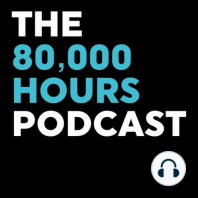105 min listen

Benjamin Todd on what the effective altruism community most needs (80k team chat #4)
Benjamin Todd on what the effective altruism community most needs (80k team chat #4)
ratings:
Length:
85 minutes
Released:
Nov 12, 2020
Format:
Podcast episode
Description
In the last '80k team chat' with Ben Todd and Arden Koehler, we discussed what effective altruism is and isn't, and how to argue for it. In this episode we turn now to what the effective altruism community most needs.
• Links to learn more, summary and full transcript
• The 2020 Effective Altruism Survey just opened. If you're involved with the effective altruism community, or sympathetic to its ideas, it's would be wonderful if you could fill it out: https://www.surveymonkey.co.uk/r/EAS80K2
According to Ben, we can think of the effective altruism movement as having gone through several stages, categorised by what kind of resource has been most able to unlock more progress on important issues (i.e. by what's the 'bottleneck'). Plausibly, these stages are common for other social movements as well.
• Needing money: In the first stage, when effective altruism was just getting going, more money (to do things like pay staff and put on events) was the main bottleneck to making progress.
• Needing talent: In the second stage, we especially needed more talented people being willing to work on whatever seemed most pressing.
• Needing specific skills and capacity: In the third stage, which Ben thinks we're in now, the main bottlenecks are organizational capacity, infrastructure, and management to help train people up, as well as specialist skills that people can put to work now.
What's next? Perhaps needing coordination -- the ability to make sure people keep working efficiently and effectively together as the community grows.
Ben and I also cover the career implications of those stages, as well as the ability to save money and the possibility that someone else would do your job in your absence.
If you’d like to learn more about these topics, you should check out a couple of articles on our site:
• Think twice before talking about ‘talent gaps’ – clarifying nine misconceptions
• How replaceable are the top candidates in large hiring rounds? Why the answer flips depending on the distribution of applicant ability
Get this episode by subscribing: type 80,000 Hours into your podcasting app. Or read the linked transcript.
Producer: Keiran Harris.
Audio mastering: Ben Cordell.
Transcriptions: Zakee Ulhaq.
• Links to learn more, summary and full transcript
• The 2020 Effective Altruism Survey just opened. If you're involved with the effective altruism community, or sympathetic to its ideas, it's would be wonderful if you could fill it out: https://www.surveymonkey.co.uk/r/EAS80K2
According to Ben, we can think of the effective altruism movement as having gone through several stages, categorised by what kind of resource has been most able to unlock more progress on important issues (i.e. by what's the 'bottleneck'). Plausibly, these stages are common for other social movements as well.
• Needing money: In the first stage, when effective altruism was just getting going, more money (to do things like pay staff and put on events) was the main bottleneck to making progress.
• Needing talent: In the second stage, we especially needed more talented people being willing to work on whatever seemed most pressing.
• Needing specific skills and capacity: In the third stage, which Ben thinks we're in now, the main bottlenecks are organizational capacity, infrastructure, and management to help train people up, as well as specialist skills that people can put to work now.
What's next? Perhaps needing coordination -- the ability to make sure people keep working efficiently and effectively together as the community grows.
Ben and I also cover the career implications of those stages, as well as the ability to save money and the possibility that someone else would do your job in your absence.
If you’d like to learn more about these topics, you should check out a couple of articles on our site:
• Think twice before talking about ‘talent gaps’ – clarifying nine misconceptions
• How replaceable are the top candidates in large hiring rounds? Why the answer flips depending on the distribution of applicant ability
Get this episode by subscribing: type 80,000 Hours into your podcasting app. Or read the linked transcript.
Producer: Keiran Harris.
Audio mastering: Ben Cordell.
Transcriptions: Zakee Ulhaq.
Released:
Nov 12, 2020
Format:
Podcast episode
Titles in the series (100)
#5 - Alex Gordon-Brown on how to donate millions in your 20s working in quantitative trading by 80,000 Hours Podcast